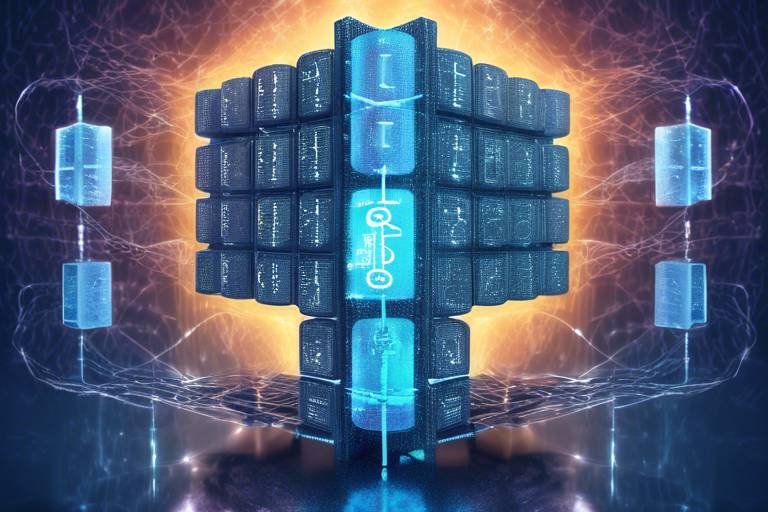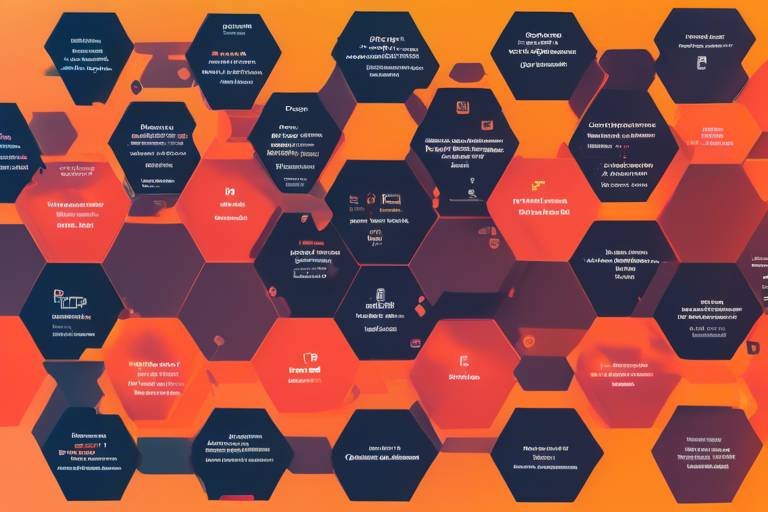Stacks (STX) - Bringing Smart Contracts to Bitcoin
In the ever-evolving landscape of blockchain technology, Stacks (STX) emerges as a groundbreaking solution that enhances the functionality of Bitcoin by enabling the use of smart contracts. Imagine Bitcoin as a solid, unyielding fortress, renowned for its security and stability. Now, picture Stacks as a vibrant city built right next to that fortress, full of life, innovation, and the potential for decentralized applications (dApps) to flourish. This article will take you on a journey through the intricacies of Stacks, exploring how it seamlessly integrates with Bitcoin to create new opportunities for developers and users alike.
So, what exactly is Stacks? It's not just another blockchain; it's a layer-1 blockchain solution that operates alongside Bitcoin, allowing developers to build dApps that harness the incredible security of Bitcoin's network. By doing so, Stacks introduces a new layer of functionality that was previously unimaginable on the Bitcoin blockchain. This means that while Bitcoin remains the king of cryptocurrencies, Stacks is like its innovative partner, expanding its capabilities and allowing for a wider range of use cases.
One of the most fascinating aspects of Stacks is its unique consensus mechanism known as Proof of Transfer (PoX). This mechanism anchors the Stacks blockchain to Bitcoin, ensuring that every transaction made on Stacks has a direct connection to the Bitcoin network. Think of it as a bridge that not only connects two islands but also allows for the safe transfer of resources between them. PoX enables STX holders to earn Bitcoin rewards, creating a symbiotic relationship between the two blockchains. In this way, Stacks not only enhances Bitcoin's utility but also incentivizes users to engage more deeply with both networks.
As we delve deeper into how Stacks works, we will uncover the advantages of PoX and its implications for both Stacks and Bitcoin users. However, like any technology, PoX also presents challenges that we must consider. It's crucial to understand both the benefits and limitations of this innovative mechanism to appreciate the full potential of Stacks in the blockchain ecosystem.
In the following sections, we will explore the exciting world of decentralized applications on Stacks, the pivotal role of smart contracts, and the myriad use cases that are transforming industries ranging from finance to gaming. As we look ahead, the future of Stacks and its integration with Bitcoin appears promising, with numerous developments and upgrades on the horizon. This article aims to provide you with a comprehensive understanding of Stacks and its potential to revolutionize the blockchain landscape.
- What is Stacks (STX)? Stacks is a layer-1 blockchain that enhances Bitcoin by enabling smart contracts and decentralized applications.
- How does Proof of Transfer (PoX) work? PoX allows STX holders to earn Bitcoin rewards while anchoring the Stacks blockchain to Bitcoin.
- What are the benefits of using Stacks? Stacks provides enhanced security, incentivization for STX holders, and increased Bitcoin adoption through dApps.
- What challenges does Stacks face? While PoX has many advantages, it also has limitations that need to be addressed for further growth.
- What types of dApps can be built on Stacks? Developers can create a variety of dApps ranging from finance to gaming, leveraging the security of Bitcoin.

What is Stacks?
Stacks is a revolutionary blockchain solution that operates in tandem with Bitcoin, and it’s here to change the game! Imagine a world where Bitcoin, the king of cryptocurrencies, can do more than just store value. With Stacks, developers can create decentralized applications (dApps) and utilize smart contracts to enhance Bitcoin's functionality. This dual-layer approach not only leverages Bitcoin's robust security but also introduces new capabilities that were previously unattainable.
At its core, Stacks allows developers to build applications that can interact seamlessly with the Bitcoin blockchain. This means that you can use Bitcoin not just as a digital currency, but as a platform for executing complex operations and transactions. Think of Stacks as a bridge that connects the simplicity and security of Bitcoin with the advanced features of modern blockchain technology. It’s like adding a turbocharger to a classic car—suddenly, it’s not just about getting from point A to point B; it’s about the thrill of the ride!
One of the standout features of Stacks is its ability to bring smart contracts to the Bitcoin ecosystem. These self-executing contracts with the terms of the agreement directly written into code allow for automation and efficiency in transactions. With Stacks, developers can create applications that handle everything from finance to gaming, all while relying on the security of Bitcoin’s network. This is a game-changer for the cryptocurrency world, as it opens up a plethora of possibilities for innovation.
Moreover, Stacks is built on a unique consensus mechanism known as Proof of Transfer (PoX). This mechanism not only ensures the security of the Stacks blockchain but also creates a direct link to Bitcoin. By anchoring to Bitcoin, Stacks offers a new layer of trust and reliability. It’s like having a safety net while you explore the exciting heights of blockchain technology!
In summary, Stacks is not just another blockchain; it’s a visionary project that enhances Bitcoin’s capabilities, allowing developers and users to explore new horizons. With its focus on decentralization, security, and innovation, Stacks is paving the way for a future where Bitcoin can do so much more than just hold value. It’s about creating a vibrant ecosystem where dApps can thrive, and users can enjoy the benefits of a more functional Bitcoin.

How Stacks Works
Stacks operates as a fascinating layer-1 blockchain that is intricately linked to Bitcoin, creating a unique ecosystem where developers can build decentralized applications (dApps) using smart contracts. At its core, Stacks enhances the functionality of Bitcoin, allowing it to go beyond a mere store of value and transform into a platform for innovation. The magic behind this integration lies in a groundbreaking consensus mechanism known as Proof of Transfer (PoX). This mechanism not only anchors Stacks to the Bitcoin blockchain, ensuring its security, but also introduces a new way for STX token holders to earn Bitcoin rewards.
So, how does it all work? When developers create dApps on Stacks, they write smart contracts that execute on the Stacks blockchain. These contracts are programmed to interact with Bitcoin, which means they can leverage Bitcoin’s security features while introducing new capabilities. This is akin to adding a powerful engine to a classic car—while the car (Bitcoin) remains robust and reliable, the engine (Stacks) allows for enhanced speed and performance. The interaction between Stacks and Bitcoin is seamless, creating a fertile ground for innovation.
One of the most compelling aspects of Stacks is its Proof of Transfer mechanism. In essence, PoX allows STX holders to lock up their tokens and, in return, earn Bitcoin as a reward. This process not only incentivizes participation in the network but also strengthens the overall security of the blockchain. The more STX that is locked up, the more robust the Stacks network becomes. It's a win-win situation for both STX holders and Bitcoin enthusiasts.
| Feature | Description |
|---|---|
| Proof of Transfer | Anchors Stacks to Bitcoin, allowing STX holders to earn Bitcoin rewards. |
| Smart Contracts | Automate processes and transactions, enabling the creation of dApps. |
| Decentralization | Ensures that applications built on Stacks are not controlled by a single entity. |
This innovative approach not only enhances the security of Stacks but also encourages a greater adoption of Bitcoin by integrating it with a plethora of dApps. Imagine a world where financial services, gaming, and social media all run on a decentralized platform that is as secure as Bitcoin itself! The potential for growth and innovation is enormous, making Stacks a vital player in the blockchain landscape.
However, the journey of Stacks is not without its challenges. As with any emerging technology, there are hurdles to overcome, including scalability and user adoption. But with a dedicated community and ongoing development, Stacks is poised to address these issues head-on, paving the way for a future where Bitcoin is not just a currency but a powerful platform for decentralized applications.

Proof of Transfer Explained
Proof of Transfer (PoX) is an innovative consensus mechanism that serves as the backbone of the Stacks blockchain. It connects the Stacks network to Bitcoin, ensuring that the security and integrity of Bitcoin are leveraged while allowing new functionalities to flourish. In essence, PoX creates a bridge between the two ecosystems, enabling developers to harness Bitcoin's robustness while building decentralized applications (dApps) on Stacks. But how does it work?
At its core, PoX operates by allowing STX holders to "lock up" their tokens in exchange for the opportunity to earn Bitcoin rewards. This process involves transferring value from the Stacks blockchain to Bitcoin, which not only incentivizes STX holders but also reinforces the security of the entire network. When STX is locked, it is effectively being used to secure the Stacks blockchain, creating a direct relationship between the amount of STX locked and the rewards distributed in Bitcoin. This unique approach not only encourages participation but also fosters a sense of community among STX holders.
The mechanics of PoX can be broken down into a few key steps:
- Locking STX: Users lock their STX tokens in a smart contract.
- Mining Rewards: In return, they receive Bitcoin rewards based on the amount of STX locked and the duration of the lock.
- Anchoring to Bitcoin: The Stacks blockchain periodically anchors its state to Bitcoin, providing a layer of security that is both unique and powerful.
One of the most exciting aspects of PoX is its potential for increased Bitcoin adoption. As more developers build dApps that interact with Bitcoin, the utility of the cryptocurrency expands, attracting new users and investors. This symbiotic relationship not only enhances the value proposition of Stacks but also contributes to the overall growth of the Bitcoin ecosystem.
However, it’s essential to understand that PoX is not without its challenges. The mechanism requires a certain level of technical understanding from users, which may deter some potential investors. Additionally, the reliance on Bitcoin's price can introduce volatility into the rewards system, potentially impacting the incentives for STX holders. Despite these challenges, the benefits of PoX, such as enhanced security and community engagement, position Stacks as a formidable player in the blockchain space.

Benefits of PoX
Proof of Transfer (PoX) is not just a novel consensus mechanism; it represents a significant leap forward in how blockchain technology can leverage the security of Bitcoin while introducing innovative features. One of the most compelling benefits of PoX is its ability to enhance security. By anchoring the Stacks blockchain to Bitcoin, PoX ensures that every transaction is backed by Bitcoin’s robust network, which has proven its resilience against attacks for over a decade. This relationship creates a symbiotic environment where both networks reinforce each other’s security.
Moreover, PoX introduces a unique incentivization model for STX holders. When users lock up their STX tokens, they can earn Bitcoin rewards, creating a direct financial incentive to participate in the ecosystem. This mechanism not only encourages long-term holding of STX but also fosters a community of engaged users who are invested in the success of both Stacks and Bitcoin. Imagine it as a garden where the more you nurture it (by holding STX), the more fruitful it becomes (in terms of Bitcoin rewards).
Another significant advantage of PoX is its potential to drive increased Bitcoin adoption. As more decentralized applications (dApps) are built on Stacks, they can seamlessly integrate with the Bitcoin network, allowing users to interact with Bitcoin in new and exciting ways. This integration can lead to a wider acceptance of Bitcoin in various sectors, from finance to gaming, as dApps provide practical solutions that utilize Bitcoin’s inherent advantages.
In addition to these benefits, PoX contributes to the overall decentralization of the Stacks ecosystem. By allowing users to earn rewards through the proof of transfer mechanism, it democratizes access to earning potential, making it possible for a broader audience to participate in the blockchain space. This is particularly important in a world where traditional financial systems often exclude many individuals.
In summary, the benefits of Proof of Transfer are multifaceted. It not only enhances the security of the Stacks blockchain by leveraging Bitcoin’s strength but also incentivizes STX holders, promotes Bitcoin adoption, and fosters a more decentralized ecosystem. As the Stacks network continues to grow, the implications of PoX will likely expand, paving the way for innovative applications and a more interconnected blockchain landscape.
- What is Proof of Transfer (PoX)? PoX is a consensus mechanism that allows Stacks to anchor its blockchain to Bitcoin, providing enhanced security and enabling STX holders to earn Bitcoin rewards.
- How does PoX benefit STX holders? By participating in PoX, STX holders can lock their tokens and earn Bitcoin rewards, creating a financial incentive to engage with the Stacks ecosystem.
- Can dApps built on Stacks interact with Bitcoin? Yes, dApps on Stacks can seamlessly integrate with Bitcoin, enhancing its usability and adoption across various sectors.
- What are the long-term implications of PoX? The long-term implications include increased Bitcoin adoption, a more decentralized ecosystem, and the potential for innovative applications that leverage both Stacks and Bitcoin.

Challenges of PoX
While the Proof of Transfer (PoX) mechanism offers a plethora of advantages, it is not without its challenges. One of the primary concerns revolves around the complexity of the mechanism itself. For many new users, understanding how PoX works can be daunting. It requires a solid grasp of both Stacks and Bitcoin, which may deter some potential participants from engaging with the ecosystem. This complexity can lead to a steep learning curve, making it less accessible to the average user.
Another challenge is the market volatility of Bitcoin. Since PoX ties rewards directly to Bitcoin, fluctuations in Bitcoin’s price can impact the earnings of STX holders. For instance, during periods of high volatility, the perceived value of the rewards may diminish, leading to uncertainty among users. This can create an unstable environment for those relying on consistent returns, which may ultimately affect the overall adoption of Stacks.
Moreover, the reliance on Bitcoin's network can be seen as both a strength and a weakness. While it enhances security, it also means that any issues or delays within the Bitcoin network can directly affect the performance and operations of Stacks. For example, if Bitcoin experiences congestion or technical difficulties, dApps built on Stacks might face disruptions, leading to a less reliable user experience.
Additionally, there are security concerns that come with any blockchain technology. Although PoX is designed to enhance security, the introduction of new smart contracts and dApps can create vulnerabilities. Developers must be vigilant in auditing their contracts to prevent exploits that could compromise user funds. The responsibility for security ultimately lies with the developers, and any oversight could lead to significant financial losses.
Lastly, the regulatory landscape poses a challenge for Stacks and PoX. As governments around the world begin to scrutinize cryptocurrencies and blockchain technologies, the potential for regulatory changes could impact the operation of Stacks. Developers and users alike must stay informed about evolving regulations to ensure compliance, which can add an additional layer of complexity to the ecosystem.
In summary, while PoX is a groundbreaking mechanism that propels Stacks into the forefront of blockchain innovation, it faces challenges that must be addressed. The complexity of the system, market volatility, reliance on Bitcoin’s network, security concerns, and regulatory scrutiny are all factors that could influence its success. As the Stacks community continues to grow and adapt, navigating these challenges will be crucial for the long-term viability of both Stacks and its integration with Bitcoin.
- What is Proof of Transfer (PoX)? PoX is a consensus mechanism that allows STX holders to earn Bitcoin rewards by locking their STX tokens, which helps secure the Stacks blockchain.
- How does PoX benefit STX holders? STX holders can earn Bitcoin by participating in PoX, creating an incentive for holding and using STX tokens.
- Can Stacks dApps operate independently of Bitcoin? No, Stacks dApps are designed to leverage Bitcoin’s security and functionality, making them inherently linked to the Bitcoin network.
- What are the risks associated with using Stacks? Risks include market volatility, security vulnerabilities in smart contracts, and the potential for regulatory challenges.

Decentralized Applications on Stacks
Decentralized applications, or dApps, are revolutionizing the way we interact with technology, and Stacks is at the forefront of this movement by enabling dApps that leverage the power of Bitcoin. Imagine a world where applications are not controlled by a single entity, but rather operate on a decentralized network, providing users with greater security and transparency. With Stacks, developers can build these innovative applications while utilizing Bitcoin’s robust security features. This unique capability opens the door to a myriad of possibilities, allowing for the creation of applications that can transform various industries.
One of the most exciting aspects of dApps on Stacks is their ability to interact directly with Bitcoin's blockchain. This means that developers can create applications that not only function independently but also harness the value and security of Bitcoin. For instance, imagine a decentralized finance (DeFi) application that allows users to lend and borrow Bitcoin without the need for a traditional bank. This is just one example of how Stacks empowers developers to create solutions that challenge the status quo.
In the Stacks ecosystem, dApps can take many forms, including:
- Finance: Decentralized finance applications that offer lending, borrowing, and trading services.
- Gaming: Blockchain-based games that utilize Bitcoin for in-game transactions and rewards.
- Social Media: Platforms that prioritize user privacy and data ownership.
- Marketplaces: Decentralized platforms for buying and selling goods without intermediaries.
What makes these dApps on Stacks particularly compelling is their programmability. Developers can create complex logic and workflows using smart contracts, which automate processes and ensure that transactions are executed only when certain conditions are met. This not only enhances the user experience but also minimizes the risk of fraud and errors. Furthermore, because these applications are built on Stacks, they benefit from the security of Bitcoin, making them less susceptible to attacks compared to traditional applications.
Moreover, the Stacks ecosystem encourages a collaborative environment where developers can share their creations and build upon each other's work. This fosters innovation and accelerates the development of new applications that can address real-world problems. As more developers join the Stacks community, we can expect to see an explosion of dApps that cater to various needs, from finance to entertainment and beyond.
In conclusion, the potential for decentralized applications on Stacks is immense. By leveraging Bitcoin’s security and creating a platform for innovation, Stacks is paving the way for a future where dApps can thrive, providing users with more control over their digital lives. The journey has just begun, and as the technology continues to evolve, we can only imagine the exciting possibilities that lie ahead.
1. What are decentralized applications (dApps)?
Decentralized applications are software applications that run on a blockchain or peer-to-peer network, allowing for greater transparency and control for users, as they are not managed by a single entity.
2. How does Stacks enhance Bitcoin's functionality?
Stacks introduces smart contracts and decentralized applications to the Bitcoin ecosystem, allowing developers to build new functionalities while leveraging Bitcoin's security.
3. What is the significance of Proof of Transfer (PoX) in Stacks?
Proof of Transfer is a consensus mechanism that anchors Stacks to Bitcoin, allowing STX holders to earn Bitcoin rewards and ensuring security and efficiency for the network.
4. Can I build my own dApp on Stacks?
Absolutely! Stacks provides the tools and infrastructure needed for developers to create their own decentralized applications, making it accessible for anyone interested in building on the Bitcoin network.
5. What industries can benefit from dApps on Stacks?
Various industries can benefit, including finance, gaming, social media, and e-commerce, as dApps can provide innovative solutions to traditional challenges.

The Role of Smart Contracts
Smart contracts are like the unsung heroes of the blockchain world, and when it comes to Stacks, they play a pivotal role in unlocking the full potential of Bitcoin. But what exactly are smart contracts? Simply put, they are self-executing contracts with the terms of the agreement directly written into code. This means that once the conditions are met, the contract executes automatically without the need for intermediaries. Imagine a vending machine: you put in your money, select your item, and voilà! The machine delivers your snack without anyone needing to step in. That’s how smart contracts work, and they bring this level of automation and efficiency to the blockchain.
On the Stacks platform, smart contracts are not just a feature; they are a game-changer. They allow developers to create decentralized applications (dApps) that can interact seamlessly with Bitcoin. This interaction is crucial because it means that dApps can leverage Bitcoin's security while introducing new functionalities. For instance, developers can build applications for decentralized finance (DeFi), gaming, and even supply chain management, all while utilizing the robust security that Bitcoin offers. This synergy between Stacks and Bitcoin creates a rich ecosystem where innovation can thrive.
One of the most exciting aspects of smart contracts on Stacks is their programmability. Developers can write complex logic into these contracts, enabling them to handle a wide variety of tasks. For example, a smart contract could automatically distribute funds based on specific conditions being met, such as the completion of a project milestone. This not only streamlines processes but also reduces the risk of human error. Moreover, the security features inherent in smart contracts help protect against fraud and manipulation, making transactions more trustworthy.
As we dive deeper into the features of smart contracts within the Stacks ecosystem, we can see that they offer:
- Transparency: All transactions are visible on the blockchain, ensuring that everyone can verify the contract's execution.
- Immutability: Once deployed, smart contracts cannot be altered, providing a level of security that traditional contracts lack.
- Cost Efficiency: By eliminating intermediaries, smart contracts can significantly reduce transaction costs.
With these features, the potential use cases for smart contracts on Stacks are virtually limitless. From financial services that automate lending and borrowing to games that reward players with cryptocurrency based on their achievements, the possibilities are expansive. Imagine a gaming platform where players earn Bitcoin by completing challenges—this is not just a dream; it's becoming a reality thanks to smart contracts.
In conclusion, the role of smart contracts in the Stacks ecosystem cannot be overstated. They are the backbone of decentralized applications, enabling innovative solutions that enhance Bitcoin's capabilities. As we continue to explore the potential of Stacks, it’s clear that smart contracts will remain at the forefront, driving forward the next wave of blockchain technology.
- What are smart contracts? Smart contracts are self-executing contracts with the terms of the agreement directly written into code, allowing for automated execution without intermediaries.
- How do smart contracts benefit Stacks? They enable the creation of decentralized applications that can interact with Bitcoin, leveraging its security while introducing new functionalities.
- What are some use cases for smart contracts on Stacks? Use cases include decentralized finance (DeFi), gaming, supply chain management, and more, providing a wide array of applications.
- Are smart contracts secure? Yes, smart contracts are designed to be secure and immutable, reducing the risk of fraud and manipulation.

Smart Contract Features
When we talk about smart contracts within the Stacks ecosystem, it’s like opening a treasure chest filled with innovative tools that empower developers and users alike. These digital contracts are not just lines of code; they are the backbone of decentralized applications (dApps) that can operate autonomously, executing transactions and processes without the need for a trusted intermediary. So, what makes these smart contracts so special?
First off, let’s discuss programmability. Smart contracts on Stacks are designed to be highly programmable, which means developers can create complex logic and workflows tailored to their specific needs. Imagine being able to automate the entire process of buying a house, from the initial offer to the final transfer of ownership, all without needing a real estate agent. That’s the power of programmability!
Another standout feature is security. Stacks leverages Bitcoin’s robust security model, which is like having a fortress to protect your assets. Smart contracts are executed on the Stacks blockchain, but they are anchored to Bitcoin, ensuring that the security and integrity of transactions are upheld. This connection means that even if something goes wrong in the Stacks ecosystem, the security of Bitcoin acts as a safety net.
Furthermore, the ability to create complex decentralized applications is a game-changer. Developers can build applications that can interact with each other, share data, and even integrate with existing Bitcoin services. For example, imagine a decentralized finance (DeFi) application that allows users to lend and borrow Bitcoin while ensuring that all transactions are transparent and immutable. This interconnectivity opens up a world of possibilities, enabling a rich ecosystem of dApps that can cater to various industries.
In addition to these features, Stacks smart contracts also come with upgradability. Unlike traditional contracts that are often set in stone, the smart contracts on Stacks can evolve. This means that developers can update their contracts to enhance functionality or fix issues without losing the integrity of the existing agreements. It’s like having a car that you can continuously upgrade with the latest technology without having to buy a new one every few years!
To summarize, the features of smart contracts in the Stacks ecosystem include:
- Programmability: Tailored logic and workflows for diverse applications.
- Security: Anchored to Bitcoin’s robust security model.
- Complex dApp Creation: Interconnected applications that share data and services.
- Upgradability: The ability to evolve and enhance contracts over time.
These features not only enhance the functionality of Bitcoin but also pave the way for a new era of decentralized applications that can transform industries. As developers continue to explore the potential of smart contracts on Stacks, we can expect to see innovative solutions that could redefine how we interact with digital assets.
Q: What are smart contracts?
A: Smart contracts are self-executing contracts with the terms of the agreement directly written into code. They automate processes and transactions on the blockchain.
Q: How does Stacks enhance Bitcoin's capabilities?
A: Stacks allows developers to build decentralized applications using smart contracts while leveraging Bitcoin's security, thus expanding Bitcoin's functionality beyond just a digital currency.
Q: What is Proof of Transfer (PoX)?
A: Proof of Transfer is a consensus mechanism used by Stacks that anchors its blockchain to Bitcoin, allowing STX holders to earn Bitcoin rewards while contributing to the network's security.
Q: Can smart contracts on Stacks be changed after deployment?
A: Yes, smart contracts on Stacks have upgradability features, allowing developers to modify them as needed without compromising existing agreements.

Use Cases for Smart Contracts
Smart contracts on the Stacks platform are revolutionizing the way we think about transactions and agreements in the digital world. Imagine a world where contracts execute themselves without the need for intermediaries! This is not just a dream; it's a reality with Stacks. The ability to create decentralized applications (dApps) that leverage Bitcoin's security opens up a myriad of possibilities across various sectors.
One of the most exciting use cases for smart contracts is in the finance sector. Decentralized finance, or DeFi, is rapidly growing, and Stacks enables users to create financial instruments that are automated and transparent. For instance, consider a lending platform where users can borrow and lend cryptocurrencies without the need for traditional banks. Smart contracts ensure that the terms of the loan are met automatically, reducing the risk of default and increasing trust among participants.
Another area where smart contracts shine is in the realm of digital identity. With Stacks, users can manage their identities securely and privately. Imagine being able to prove your identity for various services without revealing personal information. Smart contracts can facilitate this by allowing users to share only the necessary data while keeping the rest private. This not only enhances security but also gives users more control over their personal information.
Moreover, the gaming industry is also tapping into the potential of smart contracts on Stacks. Developers can create games where in-game assets are tokenized and owned by the players. This means players can trade, sell, or even earn real money from their in-game items. The transparency and security provided by smart contracts ensure that ownership is clear and disputes are minimized.
In addition to finance, digital identity, and gaming, smart contracts can also be applied in supply chain management. By utilizing Stacks, companies can track products from origin to consumer, ensuring authenticity and transparency. Smart contracts can automate various processes, such as payments when goods are delivered, making the entire supply chain more efficient and reliable.
To summarize, the potential use cases for smart contracts on Stacks are vast and varied. From finance to gaming and supply chain management, the ability to create automated, trustless agreements opens up new avenues for innovation. As more developers explore the possibilities, we can expect to see a surge in unique applications that not only enhance user experience but also drive the adoption of Bitcoin and blockchain technology as a whole.
- What are smart contracts? Smart contracts are self-executing contracts with the terms of the agreement directly written into code. They automate transactions and ensure trust without the need for intermediaries.
- How does Stacks enhance Bitcoin's functionality? Stacks allows developers to build decentralized applications using smart contracts while leveraging Bitcoin's security, effectively expanding its capabilities.
- Can I earn Bitcoin through Stacks? Yes! Through the Proof of Transfer (PoX) mechanism, STX holders can earn Bitcoin rewards by participating in the Stacks ecosystem.
- What industries can benefit from Stacks' smart contracts? Industries such as finance, gaming, digital identity, and supply chain management can greatly benefit from the automation and transparency that smart contracts provide.

Future of Stacks and Bitcoin
The future of Stacks (STX) intertwined with Bitcoin is not just a mere speculation; it’s a burgeoning reality that many enthusiasts and developers are excited about. As the demand for decentralized applications (dApps) and smart contracts continues to grow, Stacks stands at the forefront, offering a unique solution that enhances Bitcoin's capabilities while maintaining its robust security. Imagine a world where Bitcoin isn’t just a store of value but a platform for innovative applications that can transform various industries. This is the vision that Stacks is bringing to life.
One of the most thrilling prospects is the potential for widespread adoption of decentralized finance (DeFi) applications built on Stacks. With Bitcoin being the most recognized cryptocurrency, integrating DeFi functionalities through Stacks could lead to a massive influx of users looking to take advantage of smart contracts without leaving the Bitcoin ecosystem. This could also result in a significant increase in the overall utility of Bitcoin, making it not just a digital gold but a versatile financial tool.
Moreover, as the blockchain landscape evolves, we can expect enhancements in the Stacks protocol itself. The development team is continually working on upgrades that will improve performance, scalability, and user experience. For instance, future iterations of Stacks could introduce more sophisticated smart contract features, allowing developers to create even more complex and useful dApps. This evolution will likely attract a broader range of developers, further enriching the ecosystem.
Another exciting aspect is the potential for collaboration between Stacks and other blockchain projects. As the crypto space matures, interoperability will become increasingly crucial. Stacks could serve as a bridge between Bitcoin and other blockchains, enabling seamless interactions and expanding the range of applications that can be built. This interconnectedness could lead to a more vibrant ecosystem where users can leverage the strengths of multiple platforms.
However, with great potential comes challenges. The Stacks community must remain vigilant about maintaining security and usability as it scales. The integration of new features and functionalities should not compromise the foundational principles of decentralization and security that Bitcoin is built upon. Continuous community engagement and feedback will be vital in navigating these challenges.
In conclusion, the future of Stacks and Bitcoin is promising, filled with opportunities for innovation and growth. As we look ahead, it’s clear that Stacks is not just enhancing Bitcoin; it’s redefining what’s possible within the Bitcoin network. The journey is just beginning, and the possibilities are as vast as the imagination allows. The next few years will be crucial in shaping the landscape of cryptocurrency, and Stacks is poised to play a pivotal role in that evolution.
- What is Stacks? - Stacks is a layer-1 blockchain that operates alongside Bitcoin, enabling developers to build decentralized applications using Bitcoin's security.
- How does Stacks enhance Bitcoin's functionality? - By allowing smart contracts to be executed on Bitcoin, Stacks expands its use cases beyond simple transactions.
- What is Proof of Transfer? - Proof of Transfer is a consensus mechanism that anchors Stacks to Bitcoin, allowing STX holders to earn Bitcoin rewards.
- What are the benefits of using Stacks? - Benefits include enhanced security, incentivization for STX holders, and increased adoption of Bitcoin through integrated dApps.
- What challenges does Stacks face? - Challenges include ensuring security while scaling, maintaining usability, and fostering community engagement.
Frequently Asked Questions
- What is Stacks (STX)?
Stacks (STX) is a layer-1 blockchain solution that enhances Bitcoin’s functionality by enabling smart contracts and decentralized applications (dApps). It operates alongside Bitcoin, leveraging its security while introducing new capabilities for developers and users alike.
- How does Stacks work?
Stacks utilizes a unique consensus mechanism known as Proof of Transfer (PoX). This mechanism anchors the Stacks blockchain to Bitcoin, allowing STX holders to earn Bitcoin rewards while ensuring security and efficiency within the ecosystem.
- What is Proof of Transfer (PoX)?
Proof of Transfer is a mechanism that allows STX holders to lock their tokens and earn Bitcoin as a reward. It creates a symbiotic relationship between Stacks and Bitcoin, where the security of Bitcoin enhances the functionality of Stacks.
- What are the benefits of using PoX?
The benefits of Proof of Transfer include enhanced security due to Bitcoin’s robust network, incentivization for STX holders through Bitcoin rewards, and the potential for increased Bitcoin adoption via integrated dApps that utilize the Stacks platform.
- What challenges does PoX face?
While PoX offers many advantages, it also presents challenges such as potential scalability issues and the need for STX holders to understand the mechanics of locking their tokens to earn Bitcoin rewards effectively.
- What types of decentralized applications can be built on Stacks?
Stacks enables a wide range of decentralized applications, including financial services, gaming platforms, and social networks. These dApps can interact directly with Bitcoin, offering innovative solutions across various sectors.
- How do smart contracts work on Stacks?
Smart contracts on Stacks automate processes and transactions, allowing for programmable logic that can securely execute agreements without intermediaries. This enhances Bitcoin's capabilities by introducing complex functionalities.
- What are some real-world use cases for smart contracts on Stacks?
Smart contracts on Stacks can be used in various applications, such as decentralized finance (DeFi) platforms, NFT marketplaces, and gaming applications, showcasing the versatility and potential of this technology in everyday life.
- What does the future hold for Stacks and Bitcoin?
The future of Stacks looks promising as it continues to evolve and integrate with Bitcoin. Potential developments may include upgrades to the Stacks protocol, new dApps, and enhanced interoperability, which could significantly impact the broader blockchain landscape.



















